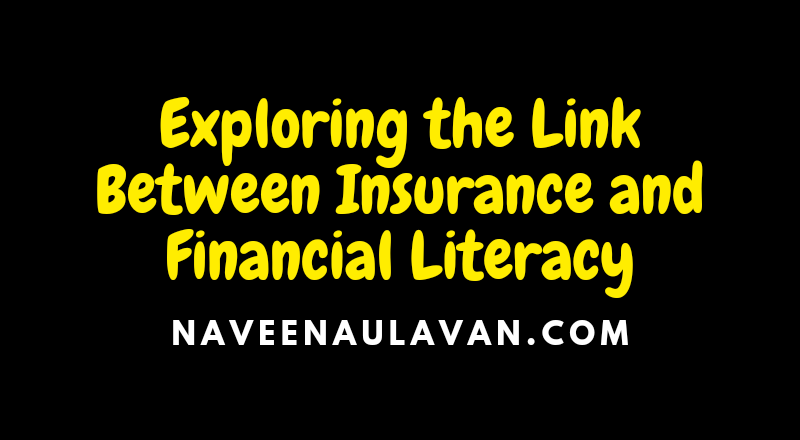Financial literacy is the capacity to understand and utilize financial skills knowledge and tools to make sound financial decisions. It empowers individuals to manage their money effectively save for the future and protect themselves against financial risks. Insurance on the other hand provides financial protection against unforeseen events and helps individuals and businesses recover from financial losses. In this article we will explore the link between insurance and financial literacy and discuss why having a good understanding of insurance is crucial for overall financial well-being.
The Importance of Financial Literacy
Financial literacy plays a vital role in an individual’s ability to make informed financial decisions. It encompasses skills such as budgeting understanding debt investing and managing risk. Without adequate financial literacy individuals may struggle to navigate the complex world of personal finance resulting in poor financial decisions and increased vulnerability to financial risks.
The Role of Insurance
Insurance acts as a safety net that protects individuals and businesses from potential financial losses due to various risks. It transfers the risk to an insurance company which in exchange for a premium provides coverage and pays for damages or losses when they occur. Insurance helps mitigate risks and provides financial stability when unexpected events occur such as accidents illness property damage or loss of income.
Link Between Insurance and Financial Literacy
Insurance as a Risk Management Tool
A crucial aspect of financial literacy involves understanding and managing risks. Insurance is an essential tool for risk management as it allows individuals to transfer the financial consequences of risks to an insurance provider. By having insurance coverage individuals can protect themselves from significant financial losses that may otherwise be difficult to recover from. However to effectively manage risks through insurance individuals must possess a basic understanding of the different types of insurance policies available and their coverage limitations.
Understanding Insurance Terminology and Concepts
Insurance policies often come with complex terminology and concepts making it challenging for individuals with low levels of financial literacy to comprehend the details and make informed decisions. For example understanding deductibles premiums coverage limits and policy exclusions is crucial to selecting the right insurance policy. Financially literate individuals are more likely to grasp these concepts and make educated choices that align with their needs and budget.
Comparing Insurance Options
Financial literacy enables individuals to compare different insurance options and select policies that provide the best coverage at a reasonable cost. With an understanding of insurance terminology individuals can evaluate policy terms conditions and exclusions to find a policy that adequately covers their needs. By comparing multiple insurance providers individuals can also secure competitive premiums ensuring they receive value for their money.
Budgeting for Insurance Premiums
Financial literacy includes the ability to manage personal budgets effectively. Knowing how to allocate funds for insurance premiums is crucial for maintaining coverage and protecting against risks. Without sufficient financial literacy individuals may not prioritize insurance in their budget and consequently expose themselves to financial vulnerability. Understanding the costs associated with insurance and incorporating them into a budget helps ensure individuals can maintain adequate coverage throughout their lives.
Identifying and Mitigating Insurance Gaps
Financially literate individuals are also better equipped to identify potential insurance gaps and take necessary measures to fill them. By evaluating their overall risk exposure individuals can identify areas where they may be underinsured or completely uninsured. This awareness allows individuals to take proactive steps to mitigate potential risks by adjusting their insurance coverage. For example someone with a proper understanding of insurance may recognize the need for additional life insurance coverage to protect their family’s financial future.
Conclusion
Financial literacy and insurance are intertwined concepts that contribute to an individual’s overall financial well-being. Understanding insurance and its role in managing risks is crucial for making informed decisions and protecting against financial vulnerabilities. By enhancing financial literacy individuals can navigate the world of insurance more effectively select appropriate coverage and ensure a stable financial future. Therefore it is essential to promote financial literacy to foster a society that is better informed about insurance and equipped to make sound financial choices.
